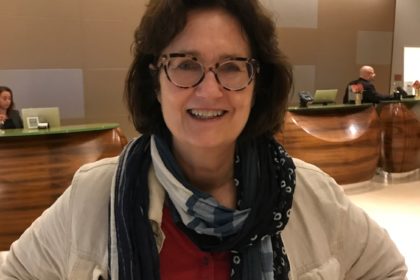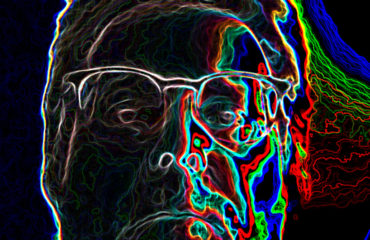IT CAME IN by Nancy Zafris

 Painting by Camille Woods, a working artist based in Austin, Texas.
Painting by Camille Woods, a working artist based in Austin, Texas.
Read by Laura Lipson
with a yawn to the rural community of Nishigun where Chieko had returned home, a minor celebrity with her newfound American-sounding English that was more slurs and mumbles than fluency. It proved useless back in the Japanese school system she hated so much, where the written English they studied remained as incomprehensible as ever. A year in America and not a whit of improvement in the tests they forced her to take. She was no closer to deciphering cruel paragraphs written by Charles Dickens and Edgar Allan Poe. Upon her return from Ohio, her celebrity status had surged, then quickly flattened; she was close to being outed as the same old dim Chieko. She rode her bike home from ronin study, head lost in dark dreams. She rode with the other girls who for now were silent. She probably had another week before their laughter and taunts began. Kimi-chan would stand by as her friend, but she missed her American friends. She missed Hannah to the point that her chest ached, her heart.
She wasn’t thinking much about the earthquake on the bike ride home. The major damage had already occurred farther north on the island boot of Hokkaido. All eyes were evaluating the earthquake’s infrastructure damage to its capital city. Gas leaks had forced fuel outposts to be shut down, the Sapporo airport was closed, there was no electricity to soothe the August oppression. In the one piece of good news, the epicenter was far out in the Pacific where the tidal waves gamboled remotely and harmlessly like ancient forgotten gods.
When the aftermath of one of the tidal waves traveled south and intruded into the countryside of her own village of Nishigun, she barely noticed. The seawater lazed ashore without intention. It came across as a briny profusion more trapped than predatory. The ocean’s ebbing rhythms washed it backward. For a moment the water retreated, before it righted itself and calmly advanced.
Chieko watched it from atop a hill. It was soothing.
The surf lapped forward toward the bridge. The water level remained low. The cars on the bridge had jammed, and now celebrating guests returning from a wedding had gathered at the railing. There appeared to be no danger of the water lurching upward to sweep them away. The earthquake was over. The aftershocks were over. And this little tidal wave had turned into a sightseeing opportunity.
Chieko observed with a confused wonder. Finally to see a tidal wave, this legendary creature their country was taught to fear, finally to see it in person. It was not at all what she imagined. Not at all like Hokusai’s woodblocks they studied in school. His blue ukiyo-e waves rose with hungry white froths like tiger claws. Not at all the mountainous water, the poems they had had to memorize, not at all Kawabata’s roiling clouds. The reality below her was a wandering pool, an infinite bath. It was set in motion by a mother ocean far away, but had become in its journey a lost child floundering about in sluggish gulps.
There seemed no chance of Hokusai’s tiger pounce with these modest swells, yet a hidden power simmered within. The undercurrent began to weaken the stanchions of the bridge. The bridge began to sway. One end tilted. As the bridge surrendered into a slide, the shocked wedding guests were poured into their newly created inland sea. The bridge pitched slowly enough that most were able to run away; an old woman in a black kimono was grabbed by a rescuing hand before slipping off. The last lucky one was not so lucky, and she fell into the water just as escape was within another step’s reach, another step she could have made had it not been for the pinched gait forced by her chrysanthemum-painted kimono; she slipped in gently, and gently she was carried along. Chieko watched her. The woman did not appear to struggle; she bobbed lightly in the water, a flower. A good strategy, Chieko thought, until she realized the body was lifeless.
Still she felt calm and protected. Months earlier she had experienced the same feeling of protection when the high school quarterback had tricked her and pulled her into an Amish barn. Before she knew it, he was at her clothes and she could do nothing but let him, frightened, then knowing she was protected by Amos and the other Amish who were coming. Jared—that was the name of the high school quarterback—and she hated him, and everyone always asked her to say his name and then laughed at her pronunciation.
She stood with her bicycle, watching the scene as it transpired below. At first, the path directly downward had been her shortest route to refuge. After a quick descent into the valley that the bridge arched over, the path tunneled inland and then straight up to safety. But safety was out of reach now. It was already too late for Chieko. She had delayed too long in her dark dreams. Her friend Kimi-chan, on the other hand, had not hesitated. She had powered the bicycle downhill, under the bridge, and with a head of steam frantically pedaled upward—her soccer legs shooting her higher into the secure hills. Chieko heard screaming as the other girls on their bicycles could not keep up with Kimi-chan. Their ankles were tickled by watery fingers; then the sea’s hand wrapped round their legs and they were pulled into the water’s embrace. The bicycles bobbed one way, their bodies another.
The wedding party escaping the bridge made a loud clacking with their decorative sandals. Chieko could hear them. She thought of Amos and the clopping of horses, the rides he had given her on his wagon. And other things, all of them done for the first time with Amos.
Cars came quietly, she thought. A speedy bicycle was soundless. The louder the running, the slower the wedding guests must be going. How loud they were on the bridge. How unlucky for them to schedule joy for this day.
The people on the bridge were waving as they ran. They were waving to Chieko. They were screaming at her to get on her bicycle. They are waving at me, she heard herself say, Watanabe Chieko, third child and only daughter. Everybody loves Chieko. Everybody wants Chieko to live. Chieko’s been to America. And she thought, I look nice in my school outfit. For a moment she was not so sad. A sadness had been drowning her. She had been living in the very water she was staring at. She had not realized it until now. Finally it had come to take her home. She bowed to those she had harmed. She asked Hannah for forgiveness; she cried it out loud. She loved Hannah and wished Hannah loved her. Hannah protected her but wouldn’t say that word. Chieko loved that English word love, she said it all the time and drew hearts for Hannah that said love! love! love! She couldn’t say love to Amos though what they did must have been love. She called to Amos to remember her. She touched at the spot that had not yet grown, but she could not find its life along the flatness of her stomach. It was better this way. Her family would never have to know.
Fly! someone screamed.
In a leisurely undulation the bridge completed its tilt into the sea. Chieko was, for the moment, still perched above the water. The only path forward stayed at this height but no higher, and it ran parallel to the coast. Riding further inland meant the scribble of hills and all its ups and downs. Already the trough of her first descent was filling with water. The water was not yet dirty, Chieko noticed, so new was it to this green land. It had not had time to find the dirt underneath.
Fly! someone screamed again.
It was a real voice. Was it Hannah’s voice?
In the puddle of a descent flared something golden. She jumped on her bike and rode toward the glowing beacon. Fly! screamed the voice again.


